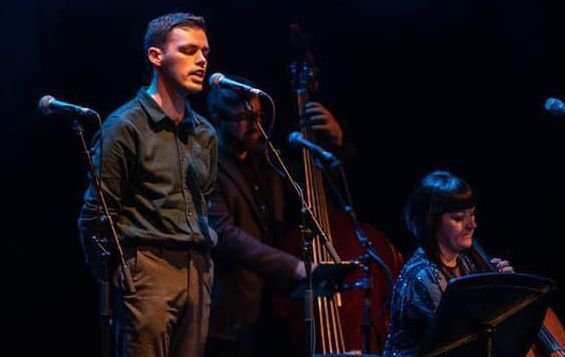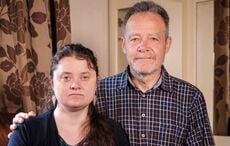Dàibhidh Stiùbhard's impressive singing is inspired by his passion for his Irish heritage.
Stiùbhard, from Cookstown, in Co Tyrone, became interested in his Irish roots at the age of 17 and pursued the Irish language and its culture in celebration.
At the age of 24, the talented singer with an incredible voice won the Tyrone and Ulster Fleadh senior singing competition and went on to release an album.
In 2019, we spoke to him about his music and his love of the Irish language.
Where do you live now? Do you use your Irish often?
I’m originally from outside Cookstown in Co Tyrone, but I now live in Holywood Co Down.
Do you speak a certain dialect of Irish?
I’ve learned Irish through the Ulster Dialect. I enjoy listening to old archive recordings of Irish speakers from Tyrone. Listening to speakers from my own county helps me reflect on how I pronounce certain words.
It definitely is important to get the pronunciation right, but you shouldn’t completely change the way you naturally would speak. If everyone spoke Irish the same it would be very boring.
Are you a native Irish speaker or a learner?
I have difficulty with the phrase "native speaker ". I feel like any person from the island of Ireland who speaks any Irish (whether they have cúpla focal or are líofa ) can be called a native speaker.
Although I’m not fluent, I’m a native to this island speaking the native language of this island. So I see myself as both a native speaker and a learner.
Your singing is just amazing. Can you tell me a little bit about how you got involved in this?
I started singing traditional songs at the age of 17. I started off learning wee folk songs, and then Scots Gàidhlig songs.
Then the more I learned and researched the more songs I found closer to home. People singing songs about places I knew [or] better yet, people singing songs in my accent. It was like falling into a wonderland that I knew I wanted to be part of. In earlier recordings of myself, I can hear I’m still figuring my own style out.
At the moment I have songs in my repertoire which are Ulster English, Scots, Irish and Scots Gàidhlig. In my singing career, I’ve done so much. I was the senior singing champion at the Tyrone and Ulster Fleadh, I recorded with and sang with the folk band, Malinky, at Celtic Connections in Glasgow [and] I've sung on BBC Radio Ulster.
I also finished recording my own album with the help of funding from the Northern Ireland Arts Council. I’m so fortunate to do what I do. I sing old songs and write new ones, and there are people who not only appreciate them but share them and send messages of support. The traditional music community really is so encouraging and welcoming.
Did you train in the area?
I taught myself everything from old recordings and research. The internet is a wonderful resource.
Now down to your Irish language...
What motivated you to learn Irish and why?
I wanted to reconnect with a Gaelic identity that I originally felt denied [from], but that I was getting closer and closer to. I also wanted to learn Irish because I wanted to prove to myself and others, that this was a language for people from both Nationalist and Unionist backgrounds.
What has been the greatest difficulty?
Effort. Because I’m not in a setting where I’m immersed in pure Gaeilge, I can sometimes slack off on both my learning and speaking of the language.
What was the best resource you came across to help you learn?
There have been loads. The Irish language community on Twitter is brilliant, Duolingo, Now You’re Talking. BBC Gaeilge programs and archive recordings. As a traditional singer, I’ve also learned a lot from singing songs as Gaeilge.
What would have made your learning experience better?
Going to the Gaeltacht. I feel I need to do an intensive immersive experience and take part in classes.
Where do you practice your Irish now?
I practice it anywhere I can. They say talking to yourself is the first sign of madness, but when you want to learn another language and there are no speakers around, it’s essential.
I’m fortunate that there are a few speakers in my place of work that I can practice with. Being a traditional singer I’m also very fortunate to have a good few friends who are Irish speakers, so they help me out here and there.
Tell us a little about the Irish language community in your area?
In Holywood, there isn’t really a community for Irish speakers or Trad musicians. That’s something that I hope to change. My aim is to set up some form of session or pop up Gaeltacht that will take place in the town once every few months.
What is your favorite Irish language word or phrase and why?
It’s changing all the time. I think my favorite word is ‘Fuinneamh’ - Energy/ Vigour. It feels like what it means and it’s fun to say.
My favorite phrase is probably from the song Maidin Fhómhair which I’ve been trying to learn:
Bhí dha ghrua aici mar rós an gharraí,
is ba bhinne a glór ná ceol na sí.
// Her cheeks were like the garden rose,
her voice was sweeter than fairy song.
What is your favorite thing about the language?
The sound and cadences of it. I feel like when I speak or hear Irish, especially Ulster Irish, I’ve unlocked another part of me. A part that connects me to the landscape.
I have a firm belief that a native language reflects the landscape and vice versa. The songs and poems of this Island are like a treasure trove in their beautiful intricacies and rhythms. I honestly love every part of the language.
What advice would you have for people who want to learn?
Do it! It’s never too late to learn, but it’s also important to remember that you’ll get out what you put in.
It’s like mining for diamonds. If you slack and think ‘maybe I’ll work tomorrow’, you get no rewards. But if you chip away every day, doing more and more, slogging through the grammar and the tenses, etc, you’ll eventually hit a wee patch of diamonds. And then you’ll get another patch. And then one day you’re having a full-blown conversation as Gaeilge.
What was the greatest moment of your language-learning career?
Probably realizing that if I wanted to learn Irish there was only me and my preconceived notions in my way. Once I got past those I was flying.
How do you feel about those who feel it shouldn’t be taught in schools?
I feel strongly that removing it from schools is the wrong thing to do. People need to realize how fortunate they are to have it taught at their local schools. I went through the whole of my education never hearing a single Irish word.
As someone who now loves the Irish language, and who believes its speakers should be given proper rights, I feel that I was cheated to have school-level Irish taken away from me just because of my religion.
To deny a child the chance to experience the Irish language in school is a twisted perversion of (and just as bad as) when children were beaten at school years before for speaking the language.
Those children and communities from the past finally got justice when the state sought to teach Irish, and now all of a sudden there are those who wish to take it away again. Irish isn’t a thing to be picked up, put down, tucked in a corner, and forgotten about. It is absolutely integral to the soul of this island.
For more on Dàibhidh Stiùbhard and to follow his amazing music, visit his website.
* Originally published in 2019. Updated in 2023.




Comments